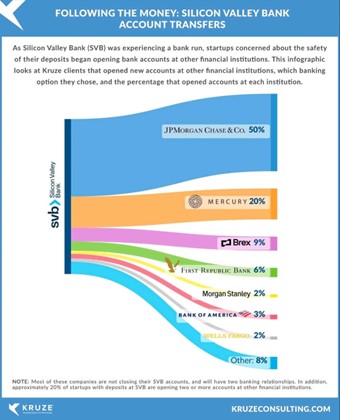Why Banking Diversification is the Key to Fintech Survival in 2023
In five days, three banks failed.
With another falling just a week later.
The first quarter of 2023 has been a wild ride for the global economy – and for the survival of Fintechs & Payment Service Providers (PSPs) in particular.
Every business is being forced to urgently review how they can reduce their exposure and minimise any over-reliance on siloed & fragmented banking partners.
Silvergate, Silicon Valley Bank (SVB), Signature Bank and Credit Suisse’s demises have sent shockwaves through the global economy. This has brought markets, fintechs and PSPs close to the brink, stoking fears of further contagion and forcing the question of how businesses can reinforce their resiliency to protect against further shocks.

15 years after the last financial catastrophe, 2023 has proven that banks with a combined $1.6 trillion in assets under management can still collapse. It serves as a brutal reminder that they remain susceptible to liquidity crunches & bank runs, and are never ‘too big to fail’.
While HSBC and UBS have gone some way to calm the markets with their takeovers of SVB and Credit Suisse respectively, the macro-economic outlook is still far from stable. Add to that rising interest rates by both BoE and SEC and companies are really feeling the squeeze, especially if they have income streams in multiple currencies, the price of doing business globally.
Both banking diversification and managing FX have never been more of a priority.
But what does this mean for payment service providers and Fintechs moving forwards?
And how can they effectively ensure operational resilience to survive any further contagion?
The Need for Banking Diversification and Robust Financial Supply Chains
All businesses, irrespective of their size, scale, sector, or scope, live and die by their supply-chain. If a critical partner collapses and a back-up solution isn’t readily available, then the entire enterprise is put at risk.
Banks are the beating heart of the Fintech ecosystem and are a core component to the survival of many Fintechs & PSPs who rely on their collection accounts, vIBAN solutions, and pay-out corridors to serve their own clients.
The recent bank failures increases the need for a more robust approach to liquidity management.

Highlighting that if businesses are over-reliant on a single provider, they run the risk of losing not only their entire product suite but also their business.
The impact of losing a critical partner for any Fintech, let alone a cross-border payment provider, global treasury solution, or international PSP, would be crippling.
Costing millions in lost revenue and operational expenses at best, and forcing them to cease trading at worst.
It’s clear that banking diversification and resiliency are now absolute non-negotiable elements of any banking partnership strategy.
We are entering an economic environment where Fintechs and PSPs need more enhanced banking redundancy, and to adequately protect themselves in the event of another breakdown they must improve their concentration mix of suppliers.
Pressing the need for a model where they can tap into a reliable ecosystem and robust financial supply chain that leverages a diverse mix of traditional bank partners and non-bank financial institutions (NBFIs).
The Challenge for Fintechs, PSPs and their Underlying Clients
However, building these partnerships, particularly for Fintechs and PSPs where they are looking to fuel their underlying client’s cross-border payment flows, is expensive and time consuming.
Often delaying their time to market, costing hundreds of thousands of pounds, and requiring huge amounts of internal resource.
In some cases, it can take anywhere between 6-12 months before a new partner bank reviews their application, assesses the KYB information, becomes comfortable with their payment flows, and finally, approves the account.
And for those that provide their clients with crypto-products, Stablecoins and on-ramp capabilities, it is becoming increasingly challenging to identify a partner who can service these payment flows in the first place.
Which has been made even harder now that Silvergate and Signature Bank are no longer trading.
The struggles in finding a reliable banking partner let alone diversifying these relationships, is not only a bottleneck to growth for most business, but in the context of 2023’s economic turmoil poses a risk to their survival.
Threatening their ability to future proof and establish water-tight business continuity plans.
And leaving many questioning how they can rapidly de-risk their supply chain and diversify, when banking partnerships take so long to secure in the first place.
Increasing FX Volatility and How PSPs & Fintechs can Alleviate Cross-Border Challenges
As economies grapple with rising inflation, and central banks introduce rapid rises in interest rates to keep this under control, businesses will also have to mitigate against the impact and any volatility this will cause in the FX markets.
While higher interest rates will increase the attractiveness of a country’s currency to overseas investors, it is counterbalanced by soaring inflation, increases in government borrowing, and any reductions in cross-border trade. This then causes greater levels of uncertainty, and forces businesses to pay closer attention to how they manage their global liquidity.

For PSPs, Fintechs, and indeed any business that manages liquidity across numerous currencies and markets, a diversified FX strategy will be needed to ensure they can optimise their transaction fees and access the best spreads.
This works in parallel to their banking diversification strategies.
Because if they are over-exposed to a single FX provider, then they risk rising fees and will not be able to capitalise on partners who can provide more cost-effective solutions, local settlement options, and smart routing capabilities.
Freemarket's Banking Aggregation Platform and Global Payment and FX Ecosystem
At Freemarket we recognise the challenges that Fintechs and PSPs face, particularly with the present risk of further economic fall-out.
As building siloed and fragmented banking relationships is expensive and time consuming, businesses are turning to banking aggregators, banking-as-a-service providers, and global payment ecosystems like Freemarket for support with cross-border payments and FX.
Taking advantage of our banking aggregation and global payment ecosystem, that helps businesses tap into a network of partner banks and NBFIs through a single platform.
The benefits of this are twofold.
Firstly, by bringing together a blend of traditional partner banks and NBFIs, our clients are more efficiently able to diversify where their payments are being routed, and funds are being held. Meaning they can lean on a wider pool of providers and secure their supply-chain by having redundancy partners already in place should one no longer be able to service them.
Secondly, by bringing together a rich mix of correspondent banking providers and NBFI solutions, businesses can access a plethora of local currency solutions from day one and streamline their cross-border transaction processes.
Enabling them to expedite growth, reduce their time to market into new jurisdictions, and ultimately improve their liquidity management in the process by ensuring they are getting the best wholesale FX rate from across our network of correspondent banking partners and NBFIs.
With much faster onboarding times and more advanced APIs, with Freemarket it’s never been easier to achieve banking diversification.
Next Steps and Final Thoughts
The events so far in 2023 have served to endorse Freemarket’s diversified approach to cross-border payment partners, and how important it is to provide businesses with access to a reliable pool of banking providers alongside robust risk management and compliance services.
For a lot of Fintechs, PSPs, MSBs, and Exchanges, the remainder of 2023 will be business critical.
In the face of rising inflation, ever-increasing interest rates, and indeed further bank contagion, it’s never been more important to sure-up the financial supply chain, and dramatically diversify their banking partners.
So, for businesses looking for a fast-moving, reliable, and well-diversified banking partnership, reach out to Freemarket to explore ways we can diversify your banking network, and expedite your growth.
Contact Freemarket today to see how our banking aggregation platform can secure your business.

